
Church leaders are worried over the ongoing exodus of millennials from Christian churches. The Daily Show correspondent Ronny Chieng takes a look at some of the different ways churches and pastors are trying to reach young adults. Enjoy!

Church leaders are worried over the ongoing exodus of millennials from Christian churches. The Daily Show correspondent Ronny Chieng takes a look at some of the different ways churches and pastors are trying to reach young adults. Enjoy!
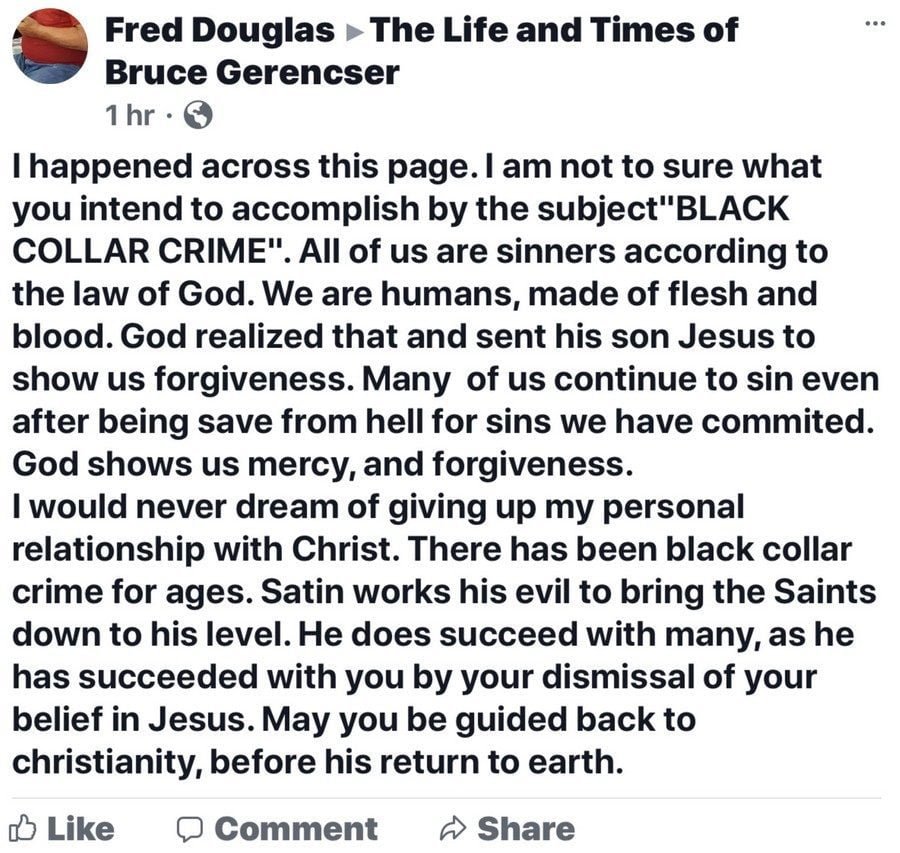
A man who lives not far from my home left the above comment on my Facebook page (if you have not yet LIKED the Life and Times of Bruce Gerencser page, I would appreciate you doing so.) Based on a bit of social media stalking, I have determined the commenter is retired and is a King James-Only Baptist. That he is a Baptist gave me a bit of context as I determined how best to respond to his comment. Last year, emergent church guru Brian McLaren said:
I feel that the role of Baptists — not Cooperative Baptist Fellowship but other Baptists — in doing harm to our nation and world is so great. I really feel well-meaning, sincere people who are deeply committed to the term ‘Baptist’ are often at the forefront of being careless about the environment. They are often at the forefront of being hateful towards Muslims. They are often at the forefront of promoting — unconsciously very often — white supremacy and continuing harm being done to racial minorities. We don’t even need to mention the harm being done to LGBTQ persons.
….
I think one of our great challenges in the Christian religion at large is for Christianity to grow up, to be a world religion meaning not just an American religion and certainly not just a southern or rural American religion, but a religion that grapples with all the challenges of our interconnected world.
In my mind, the underlying issue is actually patriarchy. We could talk about white Christian supremacy, but at the core of this is white, Christian, patriarchal supremacy. It’s a way of organizing life around powerful men.
A whole lot of people are wondering, can the Christian religion extract itself from patriarchy, or is belief in God the Father, Son and Holy Spirit so inherently patriarchal that Christians actually believe in a patriarchal universe?
….
Watching the success of Donald Trump win over especially white people, and especially white Christians and especially white evangelical and Baptist Christians, in my opinion this is a pivotal moment.
Baptists, those damn Baptists. Their theology fuels the continued support of the pussy-grabbing, adulterous president of the United States, Donald Trump. Franklin Graham and Robert Jeffress — both are Baptists — continue to defend Trump against accusations of rape, sexual assault, and adultery. It was primarily the Baptists who held the line of defense for Independent Fundamentalist (IFB) Baptist pervert Roy Moore. (Keep in mind, many generic Evangelical churches are Baptist in everything but their name.) According to Baptist theology, there’s no sinful act that can kick you out of the family of God once Jesus has saved you and the Father has adopted you into his family. This is why more than a few Evangelicals believe that I am still a Christian. Once saved, always saved; once married to Jesus, no divorce. This is why serial killers Jeffrey Dahmer and Ted Bundy went to heaven when they died. No matter the sin, if your soul has been washed in the blood of Jesus, you are forever a child of God.
Thus, for the aforementioned commenter, there’s no good reason for publishing the Black Collar Crime Series. Yes, Evangelical pastors, deacons, Sunday school teachers, worship leaders, and church congregants can and do rape women, sexually assault children, and commit all sorts of sexual crimes, and as long as these saved-by-grace Christians are in the flesh, they can and do sin. But, no matter what they do, God will forgive them. That’s what so w-o-n-d-e-r-f-u-l about Evangelical soteriology; forgiveness is only a prayer away.
Evangelicals are frequently reminded of 1 John 1:9: “If we confess our sins, he is faithful and just to forgive us our sins, and to cleanse us from all unrighteousness.” No matter what Evangelicals do, the most-awesome-God-ever stands ready and willing to grant forgiveness. Awesome, right? No matter how heinous the crime or behavior, Evangelicals are just a prayer away from a clean slate.
The commenter reminds me that all of us are sinners, and that Christians often continue to sin after they are saved. If this is so, why bother to get saved; why read the Bible, pray, tithe, and attend church on Sundays if the new birth doesn’t turn sinners into new creations (as the Bible says it most certainly does)? Of course, according to the commenter, sinning Evangelicals aren’t really to blame for their sinfulness — Satin is. Those damn satin sheets I just knew that they would lead to the fall of the human race. Humor aside, I’m sure the commenter meant SATAN was to blame for the sexual sins and crimes detailed in the Black Collar Crimes Series. Doesn’t the Bible say of believers, “greater is he (God) that is in us than he (Satan) that is in the world?” Doesn’t the Bible say that Christians are overcomers and have victory in Christ? Doesn’t the Bible say that Evangelicals who sin are of the Devil and Christ does not abide in them? Doesn’t the Bible say that faith without (good) works is dead (and I assume sexually assaulting children and raping women are not good works)?
It seems, then, that the commenter has a problem with the Bible. Perhaps his bankrupt Baptist theology has warped his thinking, leading him to believe that Christians can be perverts and adulterers and still make it to God’s Trump Hotel in the Sky®. I wonder if he has read 1 Corinthians 6:9-11:
Know ye not that the unrighteous shall not inherit the kingdom of God? Be not deceived: neither fornicators, nor idolaters, nor adulterers, nor effeminate, nor abusers of themselves with mankind, Nor thieves, nor covetous, nor drunkards, nor revilers, nor extortioners, shall inherit the kingdom of God. And such were some of you: but ye are washed, but ye are sanctified, but ye are justified in the name of the Lord Jesus, and by the Spirit of our God.
And such were (past tense) some of you, the Apostle Paul says.
Revelation 21:27 and 22: 14,15 says:
And there shall in no wise enter into it [New Jerusalem] any thing that defileth, neither whatsoever worketh abomination, or maketh a lie: but they which are written in the Lamb’s book of life.
Blessed are they that do his commandments, that they may have right to the tree of life, and may enter in through the gates into the city. For without are dogs, and sorcerers, and whoremongers, and murderers, and idolaters, and whosoever loveth and maketh a lie.
But, what do I know, right? According to the commenter, Satan has deceived me, bringing me down to the level of Evangelical Christians — his words, not mine. Say it isn’t so! How dare the commenter drag me into the Evangelical gutter. My humanistic morality teaches me that raping women, sexually assaulting church teens, and abusing children are bad/harmful behaviors. I value people and, as such, I would not abuse/assault/harm others. I don’t need salvation, and I sure as hell don’t need forgiveness from a mythical deity. I’m more in the Tony Baretta school of life: Don’t do the crime if you don’t want to do the time. (Too bad Robert Blake didn’t follow his own advice.) To the Evangelical sexual abusers, child molesters, and rapists I say this: if you don’t want to be featured in the Black Collar Crime Series, DON’T DO THE CRIME! It’s really that simple.
Why, then, is there an ever-widening Evangelical sexual abuse scandal? The short answer is this: Baptist theology; the very theology espoused by the aforementioned commenter. When people believe they are weak, helpless sinners in need of God’s power and forgiveness to make it through the day, what do you expect? Churches are filled with people who believe they can’t help themselves; that the flesh and Satan keep them from doing right. Their lives consist of a constant cycle of sin/forgiveness. You might remember what one Catholic priest said when he was arrested for abusing boys: I asked for forgiveness after every time I abused a boy. Evangelicals do the same when they pray for forgiveness AFTER they have harmed others.
God, I have an idea. How about getting the Holy Spirit — who supposedly lives in every believer, teaching, guiding, and directing them in righteousness and holiness (talk about bad job performance!) — to stop believers from harming others BEFORE they do so! Surely, an all-powerful, all-seeing, all-knowing, always-present God can act like a pre-crime bureau for Christians, stopping them from committing crimes before they do them. How hard can it be, God?
As for the WHY of the Black Collar Crime series, let me conclude this post with an excerpt from a previous post titled, Why I Write The Black Collar Crime Series :
I realize that these reports are often dark and depressing, but the only way to dispel darkness is to turn on the lights. Clergy who prey on congregants — especially children — must be exposed, prosecuted, convicted, and sent to prison. By leveraging this blog’s traffic and publishing these reports I am serving notice to law enforcement, prosecutors, and judges: we are paying attention, and if you fail to provide justice for victims, we will hold you accountable.
Sadly, many clerics have enormous power over people. How else do we explain that repeat abusers of children and sexual predators such at Lester Roloff, Jack Patterson, and Mack Ford — to name a few — never spent a day in jail for their crimes? Mack Ford, in particular, spent decades physically and psychologically destroying teenagers, yet, thanks to his connections in the community, he was never prosecuted for his crimes.(Please see Sexual Abuse in the Name of God: New Bethany Home for Girls, Teen Group Homes: Dear IFB Pastor, It’s Time for You to Atone for Your Sin, What Should We Do When Religious Freedom Leads to Child Abuse?)
Sometimes these seemingly untouchable predators are brought to justice, but not before the public puts pressure on law enforcement and prosecutors, forcing them to act. The sordid story of abuse at Restoration Youth Academy is case in point. Decades of reports about abuse were filed with local law enforcement, yet nothing was done. Yes, they finally acted and the perpetrators are now in prison, but what do we say to the hundreds of children and teenagers who were ritually abused before prosecutors got around to doing their job?
I am sure that this series will bring criticism from Evangelical zealots, reminding me that accused/charged clerics are innocent until proven guilty. While they are correct, all I am doing is sharing that which is widely reported in the news. In the nine years I’ve been writing about clergy misconduct, I can count on two fingers the number of pastors/priests/religious leaders who were falsely accused. Two, out of hundreds and hundreds of cases. The reason for so few false accusations is that no person in his or her right mind would mendaciously accuse a pastor of sexual misconduct.
People often believe that “men of God” would never, ever commit such crimes. One common thread in the crimes committed by Jack Schaap, Bill Wininger, Josh Duggar, David Farren, and a cast of thousands, is that family and fellow Christians were absolutely CERTAIN that these men of God could/would never commit the crimes with which they were charged. Even when presented with overwhelming evidence, their supporters, with heads in the sand, refuse to believe that these servants of Jesus did the perverse things they are accused of. (Please see What One IFB Apologist Thinks of People Who Claim They Were Abused, Evangelicals Use ‘We Are All Sinners’ Argument to Justify Sexual Abuse)
Secondary reasons for this series have to do with exposing the lie that Evangelicalism is immune to scandal. I remember when the Catholic sex scandal came to light. With great glee and satisfaction, Evangelical preachers railed against predator priests and the Catholic Church who covered up their crimes. Now, of course, we know that Evangelicalism is just as rotten, having its own problem with sexual abuse and subsequent cover-ups. Evangelicals love to take the high moral ground, giving the perception that their shit doesn’t stink. Well, now we know better. Not only does Evangelicalism have a sexual abuse problem, it also has big problem with pastors who can’t keep their pants zipped up. (Please see Is Clergy Sexual Infidelity Rare?)
…
To the commenter I say, instead of getting all peachy-preachy about the Black Collar Crime Series, how about focusing your outrage on the sex crimes and cover-ups that are being committed by pastors, deacons, evangelists, missionaries, choir directors, worship leaders, Sunday school teachers, janitors, bus drivers, preschool teachers, school principals, high school teachers, and church board members in scores of Evangelical churches, including Independent Fundamentalist Baptist congregations. Instead of being all worked up over the messenger, how about focusing on the message? Ask yourself, what would Jesus do? Don’t know what Jesus would do? Let me leave you with Jesus’ words in Mark 9:42: “And whosoever shall offend one of these little ones that believe in me, it is better for him that a millstone were hanged about his neck, and he were cast into the sea.”
About Bruce Gerencser
Bruce Gerencser, 62, lives in rural Northwest Ohio with his wife of 41 years. He and his wife have six grown children and twelve grandchildren. Bruce pastored Evangelical churches for twenty-five years in Ohio, Texas, and Michigan. Bruce left the ministry in 2005, and in 2008 he left Christianity. Bruce is now a humanist and an atheist. For more information about Bruce, please read the About page.
Thank you for reading this post. Please share your thoughts in the comment section. If you are a first-time commenter, please read the commenting policy before wowing readers with your words. All first-time comments are moderated. If you would like to contact Bruce directly, please use the contact form to do so.
Donations are always appreciated. Donations on a monthly basis can be made through Patreon. One-time donations can be made through PayPal.

The Black Collar Crime Series relies on public news stories and publicly available information for its content. If any incorrect information is found, please contact Bruce Gerencser. Nothing in this post should be construed as an accusation of guilt. Those accused of crimes are innocent until proven guilty.
William Weaver, pastor of Linden Presbyterian Church in Linden, New Jersey, stands accused of sexually abusing several men.
The Rev. Dr. William Weaver, who spent nearly 40 years as pastor of Linden Presbyterian Church, allegedly performed oral sex on the men as part of a ritual he said would free them from evil spirits, the report said. He used gemstones, feathers, metal strips, an angel coin and plastic bags in elaborate “exorcism” he said was taught to him by Native Americans.
….
The men who said Weaver sexually abused them gave similar accounts, dating back to 1999, the report said. He cited a passage in the Bible calling on people to use the “full armor of God” to fight the Devil.
hey said the minister would ask them to undress completely, then he would place gemstones, the coin and magnetic strip on their bodies and use a feather to scan them from head to toe. The minister would perform oral sex on them, then spit metal or plastic into a plastic bag that he said came from the men’s bodies, the report said.
The Presbytery of Elizabeth said they have received multiple allegations of sexual misconduct by Weaver.
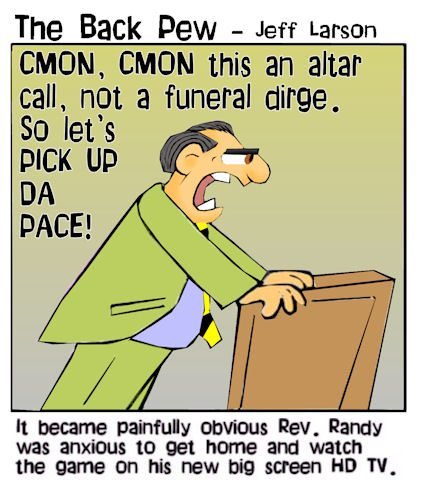
I came of age in the Independent Fundamentalist Baptist (IFB) church movement. At the age of fifteen, I was saved, baptized, and called to preach at Trinity Baptist Church in Findlay, Ohio. Gene Millioni, Ron Johnson, and Bruce Turner were my pastors at the time. (Please see Dear Bruce Turner.) Trinity Baptist was a hyper-evangelistic church affiliated with the Baptist Bible Fellowship. My pastors gave a public altar call at the end of every service. I later would attend Midwestern Baptist College to study for the ministry. Students were required to attend nearby Emmanuel Baptist Church, pastored by college chancellor Dr. Tom Malone. Altar calls were given at every service. Most IFB churches sang Just as I Am during altar calls, but Emmanuel used There is a Fountain Filled With Blood (Drawn from Immanuel’s Veins), by William Cowper. Sinners needing salvation were asked to step out of their seats and walk down the aisle to the front of the church. Once at the altar, a trained soulwinner would kneel with them, share the IFB gospel, and help them pray the sinner’s prayers. This act of faith was called “making a public profession of faith.” Sinners evangelized during the week were expected to come to church the next Sunday and made their conversion public by walking down the aisle.
Baptism was treated in a similar manner. Being immersed in three feet of water in a church baptismal was considered a public declaration of faith. By being baptized, the sinner was saying, “I publicly identify with Jesus.” Many IFB converts are baptized right after the service or the next Sunday. Preachers would often joke that the reason Baptists baptized new converts right away is that they feared never seeing them again. I was saved one week and baptized the next. And several weeks after that, I went forward during the altar call and confessed to Pastor Millioni that I believed God was calling me to preach. I stood before my friends and fellow church members and told them what God was doing in my heart. My declaration was greeted with hearty amens from older congregants. I am sure more than a few of my friends thought, Bruce Gerencser, a preacher? Yeah, right. This too shall pass! It didn’t, and for the next thirty-five years, I preached some version or the other of the Christian gospel, seeking to help sinners see their need for salvation.
Over the first fifty years of my life, I watched thousands of people walk down church aisles and ask Jesus to save them. Often, high pressure, manipulative tactics were used to coerce sinners into getting saved. I heard countless preachers say, “the hardest decision you will ever make in your life is to step out of your seat, walk down the aisle, and make a public profession of faith.” The same line was used when cajoling people into getting baptized. “Publicly identifying with Jesus in baptism is the hardest decision you will ever make!” I later concluded that there was nothing “hard” about these decisions. Here you were among Christians. How “hard” could it be to get saved and baptized? And “public?” What’s “public” about going through the IFB salvation and baptismal ritual in the safety and privacy of a local church filled with likeminded believers?
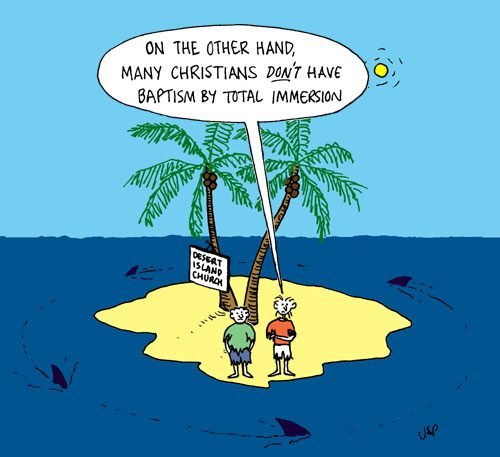
Later in my ministry years, I stopped baptizing new converts at the church. Instead, we would go to a nearby public lake and hold a baptismal service. While not as “public” as the baptisms of first century Christian converts in the book of Acts, being exposed to the gazes of worldly vacationers helped cement the importance and cost of publicly identifying with Christ. Few churches, it seems, are willing to ask much, if anything, from new converts. As long as their asses are in the seats and their Benjamins are in the plate, all is well. It is not uncommon for IFB churches to leads hundreds of sinners to Christ each year, with few of them obediently following the Lord in baptism. Some megachurches these days have pretty much given up on baptizing converts. Once or twice a year, they will “offer” baptism to the unbaptized, but rarely, if ever, stress the importance of the rite.
These days, much to the consternation of IFB preachers and Evangelical pastors, cultural Christianity rules to roost. Christians have “personal” relationships with Jesus, and most of them never share their faith. Recently, the Southern Baptist Convention — the largest Protestant denomination in the United States — reported that their membership and baptism numbers continue to decline. Scores of SBC churches didn’t take in one new member or baptize one new convert. IFB churches, who still think they live in the glory days of the 1970s and 1980s, also face precipitous membership and baptism declines. One-time IFB megachurches now are a shell of what they once were, that is, if they are still in existence. In the 1970s, Polly and I attended Emmanuel Baptist Church in Pontiac, Michigan. Emmanuel was considered one of the largest churches in America. One Sunday, they had over 5,000 people in attendance — a rare feat at the time. Today, its doors are shuttered. The same could be said for numerous other IFB churches — churches that once proudly proclaimed that they were one of the top one hundred churches in America.
It is not uncommon these days for IFB and SBC churches to go weeks and months without “public” professions of faith or a “public” baptisms. More than a few churches, attempting to ward off algae growth or smells that come from stagnant water, have drained their baptismals and use the space to store Christmas decorations or old VBS materials. The best and brightest among such churches will come up with new programs and outreaches they are sure will stop the bleeding and import new life into their churches, but if the past is any indicator, they are doomed for failure. Perhaps, it’s time to admit that Americans are really not that into Jesus anymore; that all people want is eternal life insurance and a place to get married and hold funerals. In other words, IFB and SBC congregants are well on their way to becoming Roman Catholics — morning glories who only bloom on Easter and Christmas.
In one regard, the testimony of such Christians is indeed “public.” The unwashed, uncircumcised Philistines of the world “see” how these people live out their faith, and find themselves saying, “no thanks.” My wife and I visited over a hundred Christian churches after we left the ministry. We were desperately looking for a Christianity that mattered; a congregation that took seriously the teachings of Jesus. While we met all sorts of decent people, we didn’t find one church congregation that was different from the rest. We didn’t find one church that earnestly took Jesus’ commands, teachings, and way of life — as we then understood them — to heart. (Please see But Our Church is DIFFERENT!) We decided that despite differences in liturgy and denominational affiliation, these churches were all pretty much the same. In retrospect, I have no doubt this fact played a part in our eventual abandonment of Christianity. We came to understand that for all their talk about commitment, public professions of faith, and publicly identifying with Jesus, most Evangelical churches were little more than private social clubs for likeminded people; that such clubs attract people who need “forgiveness” and need someone to tell them what to believe and how to live. Sadly, the sheeple underneath the steeple far outnumber people who think for themselves. Those who are able to rationally and critically examine religious beliefs and practices usually end up outside of the churches they once called home.
Conservative Christianity still dominates the American social and political scene. Evangelical culture warriors continue to wage war against secularism, atheism, humanism, socialism, and a culture they believe is going to Hell in a handbasket. Try as they might, these crusaders are fighting a losing battle. Oh, they might win a few skirmishes in the short term — say over abortion — but history suggests that their days are numbered. One need only look at the arc of history in Europe and other Western countries to see where the United States is headed. Old curmudgeons such as myself are unlikely to see secularism and reason vanquish the Devil in our lifetimes, but we hold out hope for our grandchildren and their children. Thanks to global warming, their world will be very different from ours, but we have high hopes that their world will be one where religion has finally been driven back into the four walls of churches where it belongs.
About Bruce Gerencser
Bruce Gerencser, 62, lives in rural Northwest Ohio with his wife of 41 years. He and his wife have six grown children and twelve grandchildren. Bruce pastored Evangelical churches for twenty-five years in Ohio, Texas, and Michigan. Bruce left the ministry in 2005, and in 2008 he left Christianity. Bruce is now a humanist and an atheist. For more information about Bruce, please read the About page.
Thank you for reading this post. Please share your thoughts in the comment section. If you are a first-time commenter, please read the commenting policy before wowing readers with your words. All first-time comments are moderated. If you would like to contact Bruce directly, please use the contact form to do so.
Donations are always appreciated. Donations on a monthly basis can be made through Patreon. One-time donations can be made through PayPal.
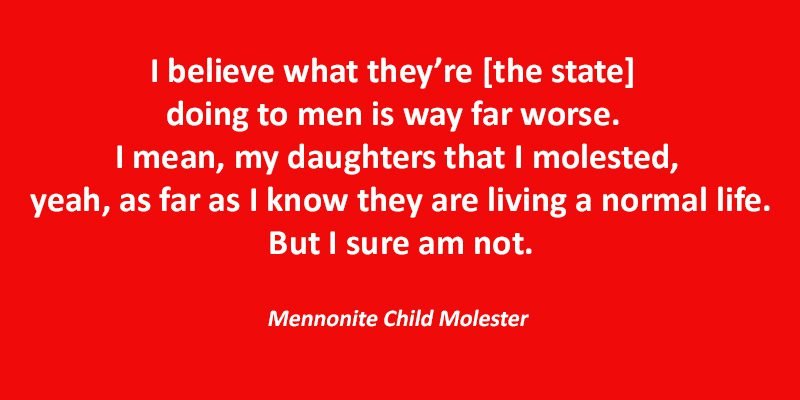
The Toledo Blade recently published a story about how some Amish and Mennonite communities expect victims of child abuse, domestic violence, and other crimes to forgive their attackers and forget the crimes ever happened. Practicing absolute forgiveness, these faith communities expect congregants to forgive regardless of what harm is caused and whether perpetrators are truly sorry for their crimes. The Toledo Blade story focuses on a woman who was excommunicated from her conservative Mennonite church because she refused to forgive her husband — a man who repeatedly sexually molested their daughters over the years. Astoundingly, the Sunday after this woman was excommunicated, her church, with arms opened wide, welcomed her husband back into the church.
After local law enforcement became aware of the husband’s criminal sexual behavior, he confessed his “sins” and was sentenced to five years of probation and 15 years on Pennsylvania’s sex offender registry. You would think that the husband would be penitent and understand why his wife no longer wanted her children anywhere near him. Unfortunately, as is often the case with sex crimes that have a religious component, the husband didn’t truly see the depth of harm he caused:
They held a seminar, and they talked about how that is sin, and I did want to be free before God and confess it and get freedom, Shirk, now 50, said in an April interview. I didn’t want something hid that should have been confessed and taken care of.
I did confession in church and made the confession in church and everybody stood and said they forgave me. I thought it was all good, but I found out that doesn’t make everybody happy.
[He laughed.]
After that, I found out a lot of people carry a lot of hatred for that sin and it’s hard for people to forgive.
….
This got way out of hand. For a little bit of touching that I did wrong. I know that it can be a big emotional thing for the girl, and it can affect their life ever after and stuff like that, and I don’t want to belittle what I did.
“There is no forgiveness for one thing. The state has no forgiveness, and therefore the church has no forgiveness, because the state is on their case that they’ll put the preacher in jail if they don’t report it.
I believe what they’re [the state] doing to men is way far worse. I mean, my daughters that I molested, yeah, as far as I know they are living a normal life. But I sure am not.
The husband continues to try to reconnect with his wife, saying:
I wouldn’t expect a woman to live with a man who is drunk and beating on her. I wouldn’t expect that. But when the church has gotten together and said this man [a convicted child molester] needs forgiveness, it would have been in her place to do that.
As you can see from the husband’s comments, he lacks remorse and contrition, and when it comes right down to it, he doesn’t think what he did is so bad. Hey, at least he didn’t beat his wife and the daughters he molested are living “normal” lives, right? The husband even went so far as to question his wife relationship with God, saying, “I just don’t understand how that [not being reconciled] is going to work out on Judgment Day.” The wife joined another conservative Mennonite church, and while she has been encouraged by them to reconcile with her husband, they have not pressed the matter with her. I am sure some readers are thinking, “WHAT THE FUCK! Why doesn’t she divorce her child-molester husband?” Well, the answer is quite simple: conservative Mennonite congregations do not permit divorce, and doing so would be immediate grounds for excommunication.
Generally, forgiving others is a good idea. Forgiveness fosters peace and helps reconcile people who are at odds with one another. However, practicing absolute forgiveness can and does cause harm, and as this story shows, it allows people to escape responsibility for their behavior. Our goal in life should be to live in ways that don’t require forgiveness, and when we do cause harm to someone, to quickly make amends or restitution. It is up to the person harmed, then, to grant forgiveness. Absolute forgiveness wrongly requires absolution regardless of whether the offender makes things right.
I saw this kind of forgiveness expectation practiced numerous times over the fifty years I spent in the Christian church. Private “sins” were expiated simply by the penitent confessing their bad behavior to God. The Bible says in 1 John 1:9: If we [Christians] confess our sins, he [God] is faithful and just to forgive us our sins, and to cleanse us from all unrighteousness. God promises to cleanse Christians from any and all sin if they will but ask him to do so. And if Christian’s ask, God wipes their sin slates clean, giving them the equivalent of a divine do-over. A sweet deal if you can get it, right?
When Christians commit public “sins” — behaviors that cause public shame to Jesus and his church — they are often brought before congregational leaders or fellow church members and expected to publicly confess their sins. Once the sinner has confessed his sins, he is absolved, and as in the case of private sins, his sin slate of wiped clean.
Whether a person is forgiven by Jesus of private or public sins, it matters not. Once forgiven — and exactly how is that determined? — congregants, including family, spouse, and children, are expected to absolutely forgive the person. Failing to do so is seen as bitterness or pride. I know of several instances where husbands abused their wives, confessed their “sins” before the church, and were granted forgiveness. Their wives were expected to forgive them and move on with life, living with men who just weeks before physically and psychologically abused them. In at least two instances that I know of, abusive husbands were welcomed back into their churches, while their wives were excommunicated for having bitter, judgmental spirits.
Even heinous crimes such as sexual abuse and rape are far too often covered over with expectations of absolute forgiveness. A recent story in the Houston Chronicle revealed that there are dozens of Southern Baptist churches who welcomed sex offenders back into their membership after their convictions. These churches KNEW these men were sex offenders, yet with arms open wide, they said, We forgive you, brother. Welcome to our church. I saw this same behavior on several occasions with Independent Fundamentalist Baptist (IFB) churches. One man, a church bus worker, was caught sexually abusing a teen boy in the church’s basement. He was forgiven by the church and escaped jail time for his crime. Twenty years later, the man was given access to children again, and as sure as the sun comes up in the morning, he sexually abused another child. This time, the man did time for his crime. While the church forgave him, they would not permit him to continue attending their services. With the blessing of his pastor and church leaders, the man joined a nearby IFB church, and to this day can be found there “faithfully” serving Jesus. Astoundingly, his wife — taught by her pastors that there are no grounds for divorce — is still with him.
Whether to forgive should be up to the person harmed. While forgiving others is generally a good idea, churches that demand forgiveness in all circumstances cause harm to people who cannot or are not ready to do so. The act of forgiveness rests with the person harmed. In the case of spousal abuse, child abuse, and sex crimes, churches which demand that victims absolutely forgive their attackers often revictimize and inflict further pain on women and children (and in some instances, men). Victims must be given the space to process what happened to them on their own terms. And if they, for some reason, cannot or will not absolve abusers of their crimes, churches and pastors should accept their decision.
I grew up in a religious culture where absolute forgiveness was expected, regardless of the seriousness of the bad behavior or crime. One of the freeing moments of my life was realizing that I didn’t have to forgive my grandparents (my mother’s father and stepmother) for what they did to me personally, and to my mother and our family in general. My grandparents were go-to-church-three-times-a-week Fundamentalist Christians. Grandpa was a violent drunk before he got saved. After asking Jesus to forgive him of his sins, Grandpa was transformed into a “wonderful” Christian who still was quite violent. And Grandma was not without her own demons. (Please see Dear Ann) Publicly, they were viewed by others as super-duper Christians who loved Jesus with all their heart, soul, and mind. And maybe they did, but underneath their religious veneer lived people prone to psychological and physical abuse.

Years before my mother’s tragic suicide (Please see Barbara), she tried to confront her dad over him sexually abusing her as a child. He told my mom that his past had been forgiven by Jesus and his sins were washed away by the blood of Jesus. He intimated to Mom that if Jesus had forgiven him, so should she. Needless to say, Mom was in no mood to forgive her child molester father. Nor did she plan to forgive his wife, a woman who caused untold heartache and pain. Years later, I reached a place where I had enough of my grandparents’ passive-aggressive behavior. I made it known that I was no longer interested in having a relationship with them. And with that, my grandparents were excised from my life and that of my family. Or so I thought anyway.
In 2003, I moved to Clare, Michigan and became the pastor of a small, struggling Southern Baptist church. One Sunday, as I was preaching, I glanced up and looked out the windows at the back of the building. I was shocked to see my grandmother sitting in her car with her new husband. (Grandpa had miserably died several years before of colon cancer.) I had a Christian version of a WTF moment, and sure enough, after the service my grandmother came up to me as if nothing had ever happened and told me she was living near me with her new hubby and asked if my family and I wanted to have dinner with them sometime. At that moment, I was dying inside, wanting to verbally reduce her to the pile of shit she was. Unfortunately, congregants were standing nearby, so I said, “sure.” Always play the part, Bruce. Always play the part. Several church members told me that they used to attend church with my grandmother. She is a wonderful Christian woman, they said. I responded, there are two sides to every story. Later, I would feel guilty over not forgiving her, so I spent time in prayer asking God to forgive me for being angry and bitter towards my grandmother.
Cleansed of my “sin,” I decided to try to forge a new relationship with my grandmother and her new husband. Polly dreaded doing so, remembering how awful my grandparents were towards her and our children. I played the “what would Jesus do” card, and off to my grandmother’s home we went — which was, ironically, a mile or so away from our home. During our dinner discussion, my grandmother decided to share a family secret that had laid buried for over fifty years: that my father was not my biological father. Granted, I had begun to question my paternity, and have since concluded that my “real” father was likely my mother’s cousin, but it was not my grandmother’s place to share this secret over dinner and in the presence of my wife and children. Why she decided to do this, I’ll never know. This was the last time I ever talked to her. Several months later, we moved back to Ohio, and outside of my grandmother trying to contact me on Facebook, I have had no contact with her. I sent her my Dear Ann article. She never responded. Of course not, it is all under the blood, buried in the deepest seas, never to be remembered again.
As an atheist and a humanist, I have learned that it is okay to not forgive some people; that some people, such as my grandparents, don’t deserve forgiveness; that them going to their graves unforgiven is just punishment for their crimes and ill-behavior. When my grandfather died, I felt nothing and shed not a tear. I was faulted for not attending his funeral, but I didn’t care. I knew it would be an act of Fundamentalist masturbation over his rotting corpse. I would hear wonderful tales about the man, the myth, the legend; the soulwinner who daily sought to evangelize the lost; the man who loved Jesus more than the world. We would not be told, as Paul Harvey used to say, “the rest of the story.”
I am fine with people thinking I am unforgiving; that I should make peace with my grandparents. My grandparents are bad people. No matter how many times they attended church, sang hymns, won souls, and gave money to the church, they were still, at least to family, nasty, judgmental, mean, and violent; guilty of behavior that would land them in jail if they did these things today. Life is too short to spend it around such people. If they need forgiveness, let them ask God for it. As their grandson and the son of the dear woman they physically and psychologically brutalized, I have no intention of granting them pardon. My grandfather is dead. Good riddance. Soon, my grandmother will meet her end too. I shall not weep, except, perhaps, for those harmed by their behavior. Too bad there’s not a Hell. If there were, I know two people who deserve first-class accommodations.
Were you taught that you must, in all circumstances, absolutely forgive? Please share your experiences in the comment section.
About Bruce Gerencser
Bruce Gerencser, 62, lives in rural Northwest Ohio with his wife of 41 years. He and his wife have six grown children and twelve grandchildren. Bruce pastored Evangelical churches for twenty-five years in Ohio, Texas, and Michigan. Bruce left the ministry in 2005, and in 2008 he left Christianity. Bruce is now a humanist and an atheist. For more information about Bruce, please read the About page.
Thank you for reading this post. Please share your thoughts in the comment section. If you are a first-time commenter, please read the commenting policy before wowing readers with your words. All first-time comments are moderated. If you would like to contact Bruce directly, please use the contact form to do so.
Donations are always appreciated. Donations on a monthly basis can be made through Patreon. One-time donations can be made through PayPal.

This is the two hundredth and ninth installment in the Songs of Sacrilege series. This is a series that I would like readers to help me with. If you know of a song that is irreverent towards religion, makes fun of religion, pokes fun at sincerely held religious beliefs, or challenges the firmly held religious beliefs of others, please send me an email.
Today’s Song of Sacrilege is I Take My Chances by Mary Chapin Carpenter.
Lyrics
I took a walk in the rain one day on the wrong side of the tracks
I stood on the rails till I saw that train
Just to see how my heart would react
Now some people say that you shouldn’t tempt fate
And for them I would not disagree
But I never learned nothing from playing it safe
I say fate should not tempt me
I take my chances, I don’t mind working without a net
I take my chances, I take my chances every chance I get
I sat alone in the dark one night, tuning in by remote
I found a preacher who spoke of the light but there was brimstone in his throat
He’d show me the way according to him in return for my personal check
I flipped my channel back to CNN and I lit another cigarette
I take my chances, forgiveness doesn’t come with a debt
I take my chances, I take my chances every chance I get
I’ve crossed lines of words and wire and both have cut me deep
I’ve been frozen out and I’ve been on fire and the tears are mine to weep
Now I can cry until I laugh and laugh until I cry
So cut the deck right in half, I’ll play from either side
I take my chances, I pay my dollar and I place my bet
I take my chances, I take my chances every chance I get
I take my chances, I don’t cling to remorse or regret
I take my chances, I take my chances every chance I get
I take my chances
I take my chances
 Someone might ask me, “Why make things so unpleasant by arguing? Why not go on with your life and let people believe as they do? Why can’t we all have mutual respect for each other?”
Someone might ask me, “Why make things so unpleasant by arguing? Why not go on with your life and let people believe as they do? Why can’t we all have mutual respect for each other?”
Mutual respect sounds pretty good to me, and it would be a great starting place. We could all be quiet and let everyone have their own thoughts.
So how about this:
I’ll get quiet when the Evangelical Christians do. When they stop their global campaign, I’ll stop writing and talking. I’ll stop speaking up when they stop trying to condition the minds of little children with songs, stories, and threats. When they quit trying to force the schools and the government to carry their message for them, I’ll stop protesting.
Many Christians accuse atheists of having a hidden agenda, which I think takes a special blend of nerve and insanity, considering that their highest priority is to convert the entire world.
By the way, there’s nothing secret about the atheist agenda. Simply stated, we won’t be forced to believe in God.
— David Mercer, Deep Calls, Atheism Versus the Easter Bunny, May 25, 2019
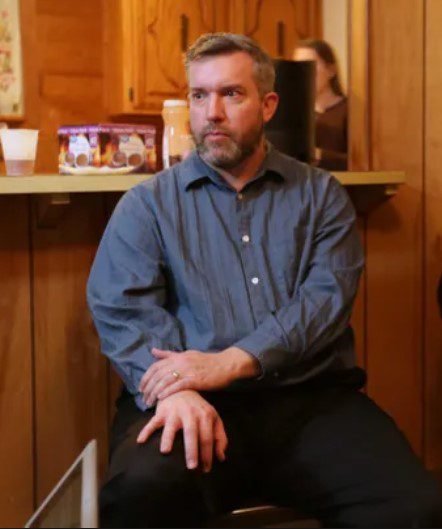
From the middle of the 20th century onward, religious sentiments in the United States shifted again. While Marxist atheism [Look, Bub, Marxism and atheism are not the same thing. You are deliberately lying to suggest otherwise. Surely, you are aware of the fact that there are Marxist Catholics?] took a strong hold in Europe, Russia and Eastern Asia, the West saw a modest incline in the number of atheists as well. Here in the United States, the number of Atheists went from about 0.5% to a whopping 3%, which is hardly noticeable really. That number has remained nearly unchanged in 30 years, fluctuating between 2% and 4% depending on who’s doing the survey. The average is 3%. [ That’s almost 10 million people, Bub.] That’s hardly a number any of us should worry about, but what atheists lack in numbers they make up for in noise. They like to flood Internet blogs, forums and chat rooms with their comments. They mock Christians and their beliefs. [No, most atheists mock Christian beliefs, not Christian people.] They file lawsuits against municipal, county and state governments for religious symbols on public property. They have a legal stranglehold on the public school systems. (All of these are Marxist tactics by the way.) For such a small percentage of the population, they absolutely demand to be heard, and they have no problem using everything at their disposal to make sure they are.[ Yes, we use things such as the U.S. Constitution and the Bill of Rights.]
Modern atheists like to point to recent declines in church affiliation as a triumph of atheism in American society. Indeed, the very word “atheist” is bantered around casually by young people these days, who have no religious affiliation whatsoever, and obviously don’t understand what the word really means. These are referred to as the “nones” because they answer “none” to the question of religious affiliation in surveys. However, when you really dig down into what these people actually believe, you’ll find out that they do believe in “a God” of some type, but they just don’t think it’s the God of Christianity or the Bible.
Yes, you read that right. The majority of “nones” today, who casually banter the word “atheist” in reference to themselves, will admit that they do believe in “a God” of some kind. If you ask them if this is the God who created nature and the universe, they will almost universally say “yes.” If you ask if characteristics of this God can be known by human reason or science, again they will almost universally say “yes.” I submit to you that what we are witnessing unfold in the United States right now is not the triumph of atheism, but rather a return to colonial-style Deism. It shouldn’t surprise us really. Americans have been down this road before. A large number of English colonists in America were Deist in the 18th century, and this century was sandwiched between two devoutly Protestant era’s [sic] in the 17th and 19th centuries. In abandoning Christian churches, Americans are simply going back to what they know as familiar to them — Deism. [Mr. Complete Christianity might want to talk to a few more NONES — especially Millennials — before coming to such ill-informed, asinine conclusions. NONES don’t give a shit about religion, period. Sure, they might think there is some sort of universal or divine energy, but Deism? Not a chance.]
….
If we’re going to re-evangelize the West, we have to understand who our primary target audience is. The “nones” are overwhelmingly Deists not atheists. [Wrong, but continue.] We don’t need to spend a whole lot of time arguing for the existence of God. Most “nones” already believe a God exists. Wrong, but continue.]They just don’t believe he’s the God of the Bible. Too many Christians spend way too much time trying to prove God exists with arguments about “First Cause” and “Pascal’s Wager,” which are all good arguments by the way. There is a reason why, however, I’ve only dedicated one page of this blog to them. It’s because the atheist argument against the existence of God is irrelevant. There just aren’t enough of atheists to really matter. [Keep telling yourself that, Bub. How about in Europe, also known as the America of the future?] Atheists have their product and nobody’s buying it. [Really? In the last decade alone, the paid membership of the Freedom From Religion Foundation has doubled. By all means tell us how does that growth compare to the number of Catholics actually attending Mass on Sundays?] Just 3% of the market share, after hundreds of years in business, isn’t much to brag about. Rather, we Christians should be spending our time focusing on who God is, not on proving whether or not he exists.
In focusing our arguments on proving the existence of God, we are narrowing our outreach to just 3% of the population. This is a group of people who likely won’t listen to us anyway. [Finally, you stopped talking out of your ass. Atheists aren’t listening because we find Christian arguments and evidence unpersuasive. Want to “reach” us? Change your schtick.] Marxist atheism, built entirely on coercion, is dying around the world [Of course, Catholicism is known as a “friendly” religion that never coerced anyone into believing, right? Talk about a huge disconnect from historical reality.] Western atheism is nearly irrelevant [Yet, you continue to rage against atheism. Why is that?] and always has been. Very few people in this group will ever listen to us. Don’t waste your time with them. Move on to more fertile ground. [And all Loki’s people said, AMEN!]
Most “nones” are Deists [Liar, liar, pants on fire. Stop making shit up, Bub.], so that means they believe in some kind of God, and most will tell you it’s the God of Nature, or the Creator God. Beyond that they won’t say who “he” or “she” is, or even if gender can be properly assigned to this Creator God. When I encounter a “none” who calls himself an “atheist,” I’ll usually ask: “So do you really believe there is absolutely no God at all, whatsoever? Or are you more inclined to say there probably is a God of nature, just not the God of the Bible or organized religion?” Almost always, at least 9 times out of 10, the “none” will respond by choosing the latter. At this point I’ll inform him that he’s not really an atheist then, because atheists don’t believe in a God. [Bub, you don’t even know how to define the words atheism/atheist.] Rather, he’s a Deist, and he’s in good company with many of America’s founding fathers, and a good number of famous scientists. You would be surprised to learn how many of these people readily accept being called a Deist, but will admit they’ve never heard the word before. [By all means, share the stories of people you have converted from “atheism” to “Deism.”]
— Shane Schaetzel, Complete Christianity, America’s Religion of Deism, May 26, 2019

Guest post by MJ Lisbeth
In my previous article, I mentioned that in 2015, Ireland became the first nation to legalize same-sex marriage by a popular vote. In another ballot last year, the Irish approved a bill that struck down the country’s near-total ban on abortion. The procedure had been allowed only if the mother’s life was at risk. That, in what was one of the world’s most devoutly Catholic countries just a generation ago.
Now the State of Alabama has, in essence, the sort of law Ireland just got rid of. The other day, Governor Kay Ivey signed a bill into a law that allows abortions only “to avoid a serious health risk to the unborn child’s mother,” for ectopic pregnancy, and if “the unborn child has a lethal abnormality.”
Oh, it gets worse: Alabama’s new law, like Ireland’s old law, doesn’t allow the termination of pregnancies that result from rape or incest. Exceptions were made, however rare, in Ireland, such as the one made in 1992 for a thirteen-year-old rape victim who was deemed at risk for suicide.
She was allowed to undergo an abortion in her own country, but the same right wasn’t granted to other girls and women. Instead, an amendment to the Irish constitution was passed, guaranteeing the right to travel to another country (usually England) for the procedure. That was fine for those who could afford to make the trip, as I’m sure Alabamans who can get to other states won’t be hampered by the new law in their own.
But in one area Alabama does old Ireland one better (or worse): Doctors who perform abortions can be punished with life in prison. Even televangelist Pat Robertson howled: “I think Alabama has gone too far,” he said during an episode of The 700 Club.
Ireland is starting to look really, really good right about now, even though I am not, and have never been, at any risk of getting pregnant. And hearing what’s transpired in Alabama and Georgia, and what may well come to pass in other states — not to mention thinking about the possibility of striking down Roe v Wade altogether — gives me the chills.
It would have given me the chills even when I was still living as a man. For me, the right to choose whether or not to carry a pregnancy to term has never been an abstraction. On one level, it is also about sovereignty over one’s body and life. Now, I’m not a constitutional lawyer or scholar. But, for what it’s worth, I have to wonder whether a government which can tell a woman or girl that she has to carry her father’s or brother’s or some stranger’s baby can also give itself the right to tell people such as I that we can’t take the hormones, have the surgeries or do whatever else we need to do in order to live at peace with ourselves. Also, would such a government imprison a doctor who prescribed the hormones or did the procedure—or even a psychiatrist who diagnosed a transgender, or a social worker who showed that transgendered person how to navigate a gender transition?
For all that I worry about such possibilities, I am affected in a more fundamental, even visceral, way by attacks on the right to a legal, safe abortion. As a child—an altar boy—I was sexually abused by a priest. That was half a century ago. I talked about it for the first time less than two years ago. By then, he was long dead, so I never had the opportunity to confront him. On the other hand, I never had to face him every day, directly or through the child I might have been forced to carry had I been, say, a 13-year-old girl instead of a 9-year-old boy. The state in which I was abused (New York) hadn’t yet legalized abortion, and Roe v Wade wouldn’t be decided for several more years. In the community in which I lived—almost entirely Catholic—young women were disowned or worse for having abortions. Even if abortion were legal, it would have been as unavailable to me as it was to most Irish women and girls—and will be for many in Alabama.
I am thinking of those women and girls. I could have been one of them. That is why I am so appalled at the law Alabama just passed. More importantly, though, I realize that for all I suffered as a result of my abuse and sexual assault, things could have been even worse for me. Unfortunately, in Alabama, they will be for many girls and young women.
I could have been one of them.
 “Over these last few years, given the wars it has waged and the international treaties it has arbitrarily reneged on, the U.S. government perfectly fits its own definition of a rogue state.” — Arundhati Roy
“Over these last few years, given the wars it has waged and the international treaties it has arbitrarily reneged on, the U.S. government perfectly fits its own definition of a rogue state.” — Arundhati Roy
You have the world’s largest military, you’re going to use it, right? Donald Trump and his team, led by National Insecurity Advisor John Bolton, are playing rogue right now with two countries not currently under U.S. control, Iran and Venezuela.
For those who already know that war is not only hell but utterly futile, the raw question hovering over these potential new exercises in mass murder transcends the obvious question: How can they be stopped? The larger question begins with the word “why” and then breaks into a thousand pieces.
Why is war the first — and seemingly the only — resort in so many national disagreements? Why is our trillion-dollar annual military budget sacrosanct? Why do we not learn from history that wars are based on lies? Why does the corporate media always hop aboard the “next” war (whatever it is) with such enthusiasm, with so little skepticism? Why does patriotism seem to require belief in an enemy? Why do we still have nuclear weapons? Why (as journalist Colman McCarthy once asked) are we violent but not illiterate?
Let’s take a look at bad, bad Iran. As CNN recently reported:
“National Security Adviser John Bolton said in a written statement Sunday that the U.S. is not seeking war with Iran, but was deploying the USS Abraham Lincoln Carrier Strike Group as well as a bomber task force to the US Central Command region in the Middle East ‘to send a clear and unmistakable message to the Iranian regime that any attack on United States interests or on those of our allies will be met with unrelenting force.’”
And Secretary of State Mike Pompeo, addressing the issue with disconcerting and unintentional candor, told reporters, according to CNN, “What we’ve been trying to do is to get Iran to behave like a normal nation.”
How would a “normal nation” respond to endless threats and sanctions? Sooner or later it would hit back. Iranian Foreign Minister Javad Zarif, speaking recently in New York, explained it thus: “The plot is to push Iran into taking action. And then use that.”
Use it, in other words, as the excuse to go to war.
And going to war is a political game, a decision made or not made by a few important individuals — Bolton, Pompeo, Trump — while the general public looks on either in support or outrage, but either way as spectators. This phenomenon provokes an enormous, unasked “why?” Why is war a top-down directive rather than a collective, public decision? But I guess the answer to that question is obvious: We couldn’t go to war that wasn’t pre-orchestrated by a small group of powerful individuals. All the public has to do is . . . pretty much, nothing.
Elham Pourtaher, an Iranian going to school in New York state, makes this plea for heightened awareness: “U.S. civil society needs to include more global perspectives on the country’s foreign policy. U.S. citizens must become more aware that their votes have grave consequences beyond their country’s borders. . . . (Their) elected administration’s foreign policy is a matter of life and death for the citizens of the other countries, especially in the Middle East.”
She also notes that “the war has already begun. U.S. sanctions are producing a level of suffering comparable to that of wartime. Sanctions in fact are a war waged by the United States against the Iranian working- and middle-classes. These groups struggle to make ends meet as unemployment dramatically increases even as the inflation rate skyrockets. The same people that the Trump administration is pretending to want to set free are the ones that are hit hardest by current U.S. policies in the Middle East.”
And, oh yeah, the ones gaining empowerment from the U.S. war games are “the most undemocratic factions of the Iranian state.” This is how it always works. Hostile aggression begets hostile aggression. A war on terror begets terror. Why do we not know this yet?
At the very least, the provocations, including the fact that Trump is considering sending troops to the area, have “created a scenario in which everyone is now very worried that some form of an accidental war at a minimum is very likely because you have too many U.S. forces and Iranian forces into too small of an area,” Trita Parsi, founder of the National Iranian American Council, said in a recent interview.
Human society is organized in such a way that war, intentional or accidental, is inevitable on a regular basis. And in the run-up to these wars, only the smallest questions are asked by the media, centering around: Is this one justified? Never, “Is this wise? Is this the best choice?” If something sufficiently provocative is done by the enemy — North Vietnam attacks a U.S. ship in the Tonkin Gulf, Iraq purchases aluminum tubes — then “we have no choice” but to retaliate on a massive scale.
The large questions only come later, such as this cry from a Syrian woman in the wake of allied air strikes on the city of Raqqa, quoted in an Amnesty International report:
“I saw my son die, burnt in the rubble in front of me. I’ve lost everyone who was dear to me. My four children, my husband, my mother, my sister, my whole family. Wasn’t the goal to free the civilians? They were supposed to save us, to save our children.”
— Robert C. Koehler, Peace Voice, War’s Unanswered Questions, May 19. 2019